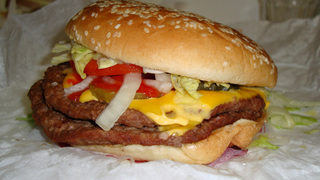
What Causes SIBO? – High Fat and Protein
Fat and Protein
As with everything, there is always “too much of a good thing” and there is no exception with a diet rich in fats and animal protein. High fat diets, contrary to popular belief are also detrimental to the onset of SIBO. Numerous research studies have outlined that the standard American diet, (which can be very high in fats, animal proteins, along with refined starches) can result in alterations in the gut microbiome. In fact, it has been shown that a diet high in fat (60%) alters the microbiome in days to favour bacteria that can survive the harsh environments of high bile salt secretion from the liver.
Now you may be thinking that it is impossible to eat a diet that high in fat, but believe it our not many of us do. Diets centered around fast foods or cheese and cured meats can reach this level of fat consumption quite easily. The thing that many of us are not aware of is that red meat is actually a really high source of fat, even though it is “categorized” officially as a protein. Surprisingly, lean proteins like fish and chicken are actually not much better when it comes to fat content.
Let me explain, but it might be easiest just to refer to a bag of pet food. Grain free pet food, made from pure animal sources clearly shows the level of protein to fat, which usually comes out to a 60:40 ratio, respectively. You see for simplicity we break our macronutrients into proteins (meat, fish, chicken, eggs, tofu), fats (like high fat dairy, vegetable oils, olive oil, and nuts) and carbohydrates, which we have already discussed. The truth is that all of these foods (short of refined oils) actually contain all of the other nutrients, just in smaller amounts than their “base” macronutrient. So what I am saying is that “protein” actually contain fats and some sugars, where vegetables are predominately carbohydrate but actually also have fats and proteins as well. You get the picture.
So here is the brass tax. Essentially, when you eat ground beef at a restaurant you are likely getting a product that is actually around 40:60 protein to fat, which if on a “high” protein diet, like the Atkins or the Bernstein diet, can easily give you a diet that is about 60% fat. Add some special sauce and cheese and your burger gets up there in fat content pretty quick.
Further, ketogenic diets are becoming more and more popular recently and require fat consumption of up to 90% of dietary calories. I did an experiment in 2013 with a 6 month ketogenic diet and found that not only did my digestive function change significantly I also became quite nutrient depleted on such a high fat diet, even with nutrient supplementation. Having said that, I believe ketogenic diets are invaluable for certain health concerns, like cancer, however require a lot of medical supervision to be done properly.
As previously discussed, bile salts can be essential in helping to reduce the effects of SIBO however higher than normal bile production has actually been shown to damage the fragile intestinal mucosal surface which can result in malabsorption and inflammation. This is because bile is extremely caustic, similar to bleach and high biliary secretion can also favour the organisms that are highly resistant to the effects of bile salts. Conveniently, many of these organisms also can survive predominately on amino acid putrefaction.
Once the intestinal mucosa is damaged, malabsorption can continue to feed the overgrowth of putrefactious bacteria resulting in overgrowth of a whole different animal! I have quantified this many times with stool testing, which indicate high levels of Bacteriodes sp., that primarily feed on high protein diets. Combine the standard American diet with anti-acid medications for heartburn, which many fast food eaters suffer from, and you have a situation where proteins are not digested, resulting in more food for bacteria to grow.
Although the Bacteriodes clan of bacteria is likely to make you thinner, according to research, or more specifically is associated with a diet that helps people loss weight, it can come at the potential risk of high inflammation, malabsorption and small intestinal bacterial overgrowth.
Inevitably, as we will discuss, a “balanced” diet is the key to a healthy happy gut ecology, but even with an exceptional diet, poor digestive function, high stress and the wrong genes can still result in SIBO. This is also a reminder that, even with all of those things aside, the most known cause of small intestinal bacterial overgrowth actually comes from a single episode of food poisoning, which can alter peoples gut function forever!
You must be logged in to post a comment.